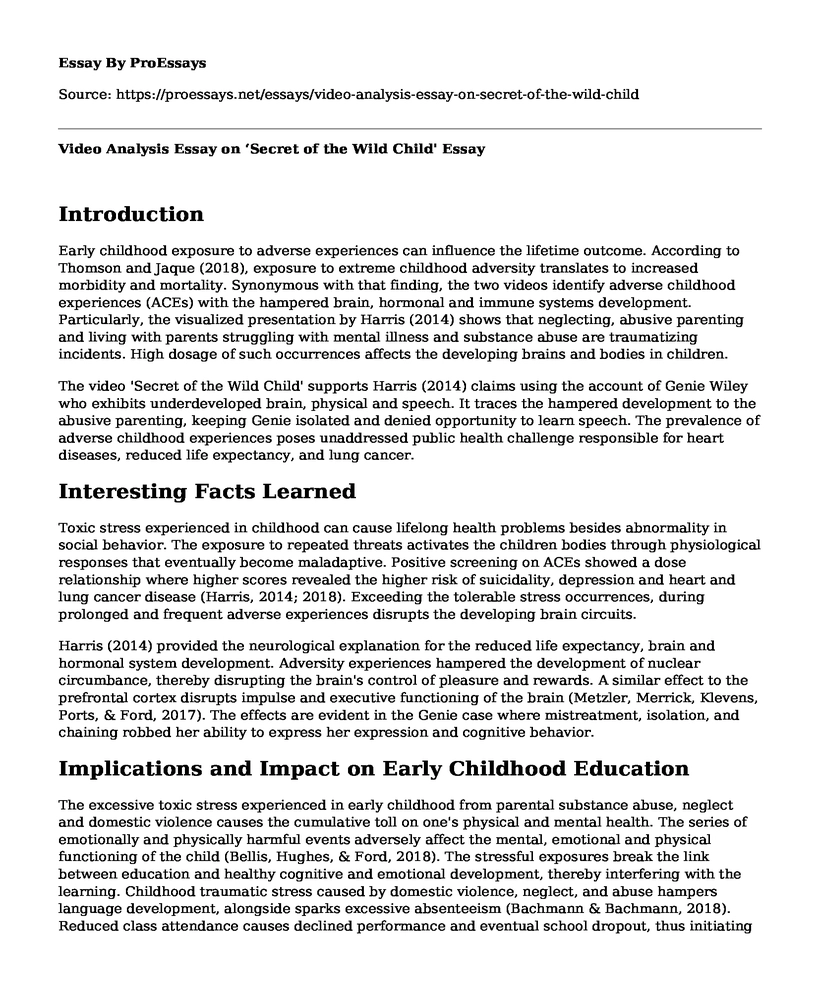Introduction
Early childhood exposure to adverse experiences can influence the lifetime outcome. According to Thomson and Jaque (2018), exposure to extreme childhood adversity translates to increased morbidity and mortality. Synonymous with that finding, the two videos identify adverse childhood experiences (ACEs) with the hampered brain, hormonal and immune systems development. Particularly, the visualized presentation by Harris (2014) shows that neglecting, abusive parenting and living with parents struggling with mental illness and substance abuse are traumatizing incidents. High dosage of such occurrences affects the developing brains and bodies in children.
The video 'Secret of the Wild Child' supports Harris (2014) claims using the account of Genie Wiley who exhibits underdeveloped brain, physical and speech. It traces the hampered development to the abusive parenting, keeping Genie isolated and denied opportunity to learn speech. The prevalence of adverse childhood experiences poses unaddressed public health challenge responsible for heart diseases, reduced life expectancy, and lung cancer.
Interesting Facts Learned
Toxic stress experienced in childhood can cause lifelong health problems besides abnormality in social behavior. The exposure to repeated threats activates the children bodies through physiological responses that eventually become maladaptive. Positive screening on ACEs showed a dose relationship where higher scores revealed the higher risk of suicidality, depression and heart and lung cancer disease (Harris, 2014; 2018). Exceeding the tolerable stress occurrences, during prolonged and frequent adverse experiences disrupts the developing brain circuits.
Harris (2014) provided the neurological explanation for the reduced life expectancy, brain and hormonal system development. Adversity experiences hampered the development of nuclear circumbance, thereby disrupting the brain's control of pleasure and rewards. A similar effect to the prefrontal cortex disrupts impulse and executive functioning of the brain (Metzler, Merrick, Klevens, Ports, & Ford, 2017). The effects are evident in the Genie case where mistreatment, isolation, and chaining robbed her ability to express her expression and cognitive behavior.
Implications and Impact on Early Childhood Education
The excessive toxic stress experienced in early childhood from parental substance abuse, neglect and domestic violence causes the cumulative toll on one's physical and mental health. The series of emotionally and physically harmful events adversely affect the mental, emotional and physical functioning of the child (Bellis, Hughes, & Ford, 2018). The stressful exposures break the link between education and healthy cognitive and emotional development, thereby interfering with the learning. Childhood traumatic stress caused by domestic violence, neglect, and abuse hampers language development, alongside sparks excessive absenteeism (Bachmann & Bachmann, 2018). Reduced class attendance causes declined performance and eventual school dropout, thus initiating a vicious cycle of social challenges that extend to adulthood. The situation compels closer scrutiny on addressing childhood adversities capable of impacting learning.
Knowing that childhood education is a primary social determinant of health outcome, it mandates the inclusion of staff with sufficient awareness of handling trauma. Importantly, the early education ecosystem should offer supportive, trusting and safe learning environment (Bachmann & Bachmann, 2018). To address the problem, early childhood educators should embrace collective investment to increase awareness on ACEs and unmask the spreading yet hidden problem gradually hampering learning. The solution relies on providing specialized training on ACEs awareness to detect and handle maltreatment in children.
Advocacy and Change to Support Children and Families in Trauma
The awareness of adverse childhood experiences as a looming public health crisis compels initiating a movement to encourage trauma-informed care in homes, health and school ecosystems. It necessitates inception of early multidisciplinary intervention to prevent the consequences identified with ACEs. The early provision of supportive, trusting and positive living conditions for the children screened positive is vital rather than delaying remediation programs (Bachmann & Bachmann, 2018). Collective investment towards the provision of child protective services, home visits, and a supportive environment is necessary alongside educating parents on ACEs consequences and need for caring relationships.
Conclusion
The revelation made by the video 'Secret of the Wild' features an informative account of Genie Wiley on the consequences of adverse childhood experiences. The disrupted brain, physical and speech development experienced by Genie supports the illustration made on lifetime effects of childhood trauma. The neurological explanation of the high risk of lung cancer and heart disease for victims of early childhood trauma calls for early collective investment to confront ACEs through tailored care programs.
References
Bachmann, M., & Bachmann, B. A. (2018). The case for including adverse childhood experiences in child maltreatment education: A path analysis. The Permanente Journal, 22, 117-122.
Bellis, M. A., Hughes, K., & Ford, K. (2018). Adverse childhood experiences and sources of childhood resilience: A retrospective study of their combined relationships with child health and educational attendance. BMC Public Health, 18, 1-12. doi:10.1186/s12889-018-5699-8
Harris, N. B. (2014). How childhood trauma affects health across a lifetime. Retrieved September 24, 2018, from https://www.ted.com/talks/nadine_burke_harris_how_childhood_trauma_affects_health_across_a_lifetime#t-946791
Harris, N. B. (2018). The deepest well: Healing the lon-term effects of childhood adversity. Boston : Houghton Mifflin Harcourt.
Metzler, M., Merrick, M. T., Klevens, J., Ports, K. A., & Ford, D. C. (2017). Adverse childhood experiences and life opportunities: Shifting the narrative. Children and Youth Services Review, 72, 141-149. doi:10.1016/j.childyouth.2016.10.021
Thomson, P., & Jaque, S. V. (2018, February). Childhood adversity and the creative experience in adult professional performing artists. Frontiers in Psychology, 9(111), 1-9. doi:10.3389/fpsyg.2018.00111
Cite this page
Video Analysis Essay on 'Secret of the Wild Child'. (2022, Aug 08). Retrieved from https://proessays.net/essays/video-analysis-essay-on-secret-of-the-wild-child
If you are the original author of this essay and no longer wish to have it published on the ProEssays website, please click below to request its removal:
- Child Welfare and Information and Communication Technology
- High School vs College Essay Example
- Should School Require Uniforms? - Essay Sample
- Paper Example on Jane: Ready for College and Romance Challenges
- Reflective Teaching: Critical Thinking for Improved Outcomes - Essay Sample
- Chimamanda Adichie's Journey from Nigeria to America: Education, Privilege, and Experience - Essay Sample
- Ways of Teaching Foreign Language - Essay Sample







